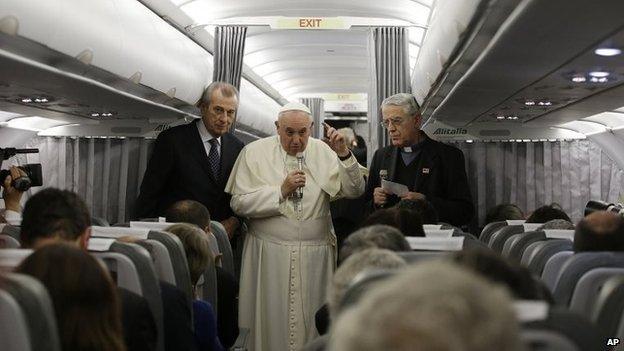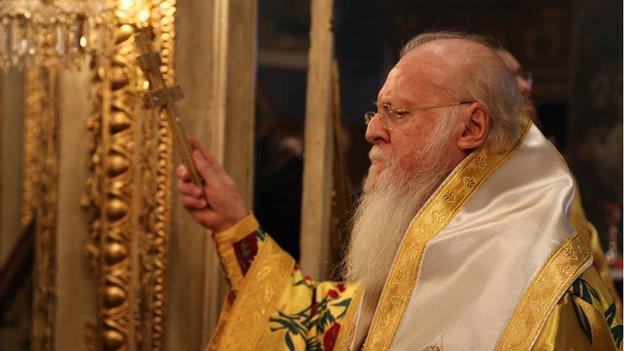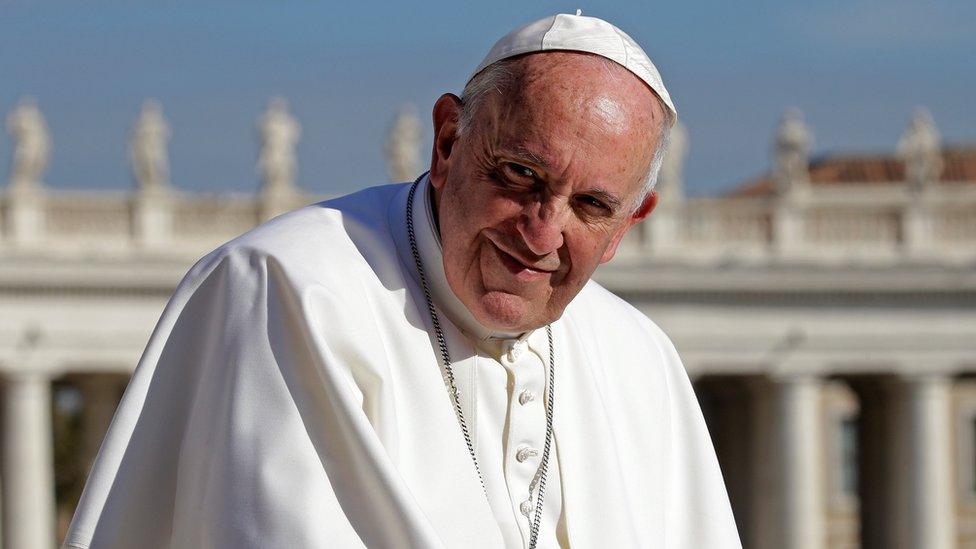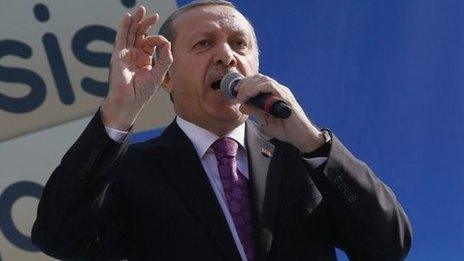Pope Francis: Muslim leaders should condemn terrorism
- Published
Pope Francis and Patriarch Bartholomew I signed a pledge to support Christians in the Middle East
Pope Francis has urged Muslim leaders around the world to condemn terrorism carried out in the name of Islam.
Speaking on board a flight back to Rome, the Pope said that he understood the harm caused by the stereotype that linked Islam with terrorism.
He said a "global condemnation" of the violence would help the majority of Muslims dispel this stereotype.
Pope Francis was returning from a three-day visit to Turkey, where he discussed divisions between faiths.
The pontiff denounced people who say that "all Muslims are terrorists".
"As we cannot say that all Christians are fundamentalists," he said.
In Istanbul, Pope Francis called for an end to the persecution of Christians in the Middle East.
In a joint declaration, the Pope and Patriarch Bartholomew I said they could not resign themselves to a "Middle East without Christians".
Patriarch Bartholomew is the spiritual leader of the world's 250 million Orthodox Christians, whose Church broke with Rome in 1054 in a schism that divided the Christian world.
Constantinople, as the modern Turkish city of Istanbul was once known, was the centre of Orthodox Christianity until the Ottoman conquest in 1453.
Only around 120,000 Christians remain in Turkey, where the vast majority of the 80 million citizens are Muslims.
Pope Francis also called for dialogue with Muslims to counter fanaticism and fundamentalism when he visited the Turkish capital, Ankara.
'Indifference of many'

Pope Francis was returning to Rome after his three-day visit to Turkey when he made his latest comments
Christians have been targeted by Muslim hardliners in Iraq and Syria in recent years, with a violent campaign of persecution by Islamic State militants this summer when they captured the Iraqi city of Mosul.
In their joint declaration, external, the two Church leaders said: "We express our common concern for the current situation in Iraq, Syria and the whole Middle East.
"Many of our brothers and sisters are being persecuted and have been forced violently from their homes. It even seems that the value of human life has been lost, that the human person no longer matters and may be sacrificed to other interests. And, tragically, all this is met by the indifference of many."
The pontiff and the patriarch also called for peace in Ukraine.
The violent conflict in Ukraine this year has accentuated differences between its large Orthodox and Catholic communities.
The Pope and the patriarch said: "We pray for peace in Ukraine, a country of ancient Christian tradition, while we call upon all parties involved to pursue the path of dialogue and of respect for international law in order to bring an end to the conflict and allow all Ukrainians to live in harmony."
As his visit drew to a close, Pope Francis met Turkey's chief rabbi, whose flock has diminished to just 17,000 people.
At the Blue Mosque on Saturday, one of the greatest masterpieces of Ottoman architecture, the Pope turned east towards Mecca, clasped his hands and paused for two minutes as the Grand Mufti of Istanbul, Rahmi Yaran, delivered a Muslim prayer.
The Pope then visited Hagia Sofia - which for almost 1,000 years was the most important Orthodox cathedral, then for nearly five centuries a mosque under the Ottomans, and is currently a museum.
For Istanbul, a city that passed from the Byzantines to the Ottomans, a place where religions, empires and cultures collided, the Pope's message of interfaith dialogue has profound resonance, says the BBC's Mark Lowen in Istanbul.

- Published27 November 2014

- Published28 October 2022

- Published20 November 2014
